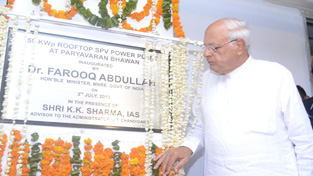Excelsior Correspondent
CHANDIGARH, July 3: Union Minister for New & Renewable Energy, Dr. Farooq Abdullah inaugurated a 50 KWp solar photovoltaic power plant on the rooftop of Paryavaran Bhawan, Chandigarh. The plant will be able to generate 65,000 units of electricity per year. He also inaugurated a 100 KWp solar photovoltaic power plant on the rooftop of Model Central Jail, Burail, Chandigarh. This plant will be able to generate 1,30,000 units of electricity per year.
These rooftop power plants are coming up as a part of the solar city programme of Government of India under which 54 cities have been selected to become solar cities in the country. Chandigarh is one of these solar cities. Chandigarh has a plan to cover almost all Government buildings with solar rooftop power plants so that each building is able to generate a part of its power requirement through its own power plant thereby reducing the demand of electricity and using more and more of clean energy. Ministry of New & Renewable Energy has already sanctioned projects to cover 30 Government buildings in Chandigarh, which will generate 3 MWp of solar power.
Dr. Farooq Abdullah had a meeting with Shivraj Patil, Governor of Punjab and Administration of UT, Chandigarh. During the meeting, it was decided that efforts will be made to cover all the Government buildings in Chandigarh with solar power plants and solar water heaters. Private building owners would also be encouraged to set up solar rooftops. These power plants would be connected with the grid so that surplus power can be fed into the grid.
Dr. Abdullah also had a meeting with Chief Minister of Punjab, Parkash Singh Badal. Various programmes for promotion of renewable energy were discussed. Dr. Abdullah the Chief Minister to encourage use of solar powered pumps for irrigation as this would help in providing irrigation water to the farmers during day time and save electricity. He also requested that solar based steam cooking systems should be installed in all the religious institutions in the State.
Trending Now
E-Paper


